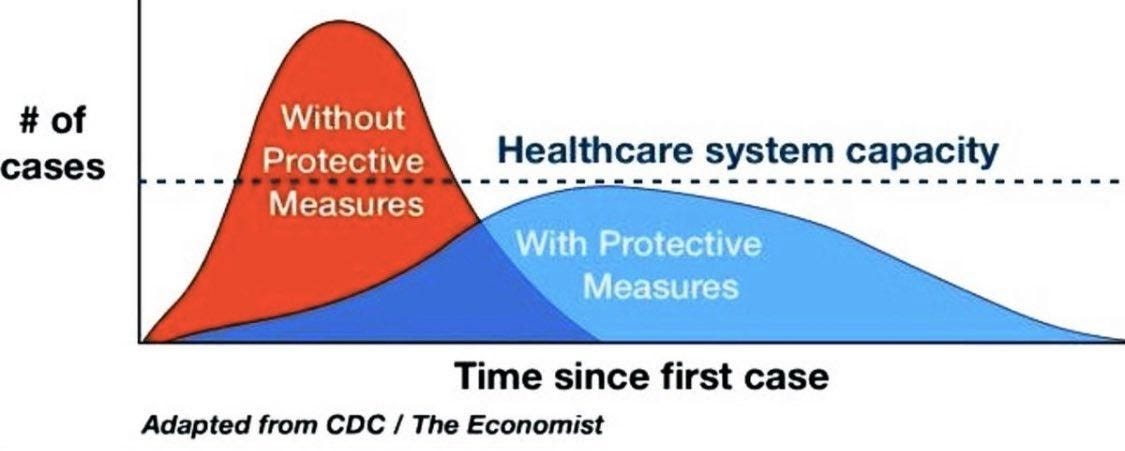Viruses of the Body and Mind
Are your beliefs setting you up for success?

Our beliefs motivate our behaviors, which, in turn, determine our fate. But how can we know whether our beliefs are setting us up for success? Are our political views providing an accurate model of human behavior? Do our religious convictions instill practices that aid our survival? When times are good, it can be hard to tell which beliefs are helping us flourish. Only when the environment presents a real challenge do we get the chance to test which of our beliefs are aiding our evolutionary fitness and which ones are endangering it. The recent outbreak of Coronavirus might be just such a challenge.
As of the latest report, over 100,000 cases of Coronavirus have been diagnosed across the globe, with likely many more yet to be confirmed. Unlike disease outbreaks of the recent past, this virus has managed to reach the status of a global pandemic in a matter of months. To accomplish this, the virus has benefited from humanity’s cognitive biases and sense-making systems to aid its rapid spread.
Based on what we know, Coronavirus spreads between humans when a healthy person inhales or ingests the respiratory droplets from an infected person's cough or sneeze. Convincing healthy strangers to get close enough to sick people for this transmission to occur is not easy. After generations of natural selection, we have evolved the ability to detect signs of illness in others and keep our distance. In a subversion of these defenses, Coronavirus’ onset is accompanied by relatively mild symptoms that enable the sick to continue their daily routines while spreading the virus among the healthy. Due to the virus’ lack of severe symptoms, and low mortality rate, it has managed to avoid triggering our innate, collective defenses that might have caused us to take more drastic action to limit its spread.
At a societal level, the virus has taken advantage of flaws in both our top-down and bottoms-up sense-making systems. From the top-down perspective, broadcast news channels have been slow to disseminate useful warnings due, in part, to the intellectual limitations and biases of the gatekeepers who determine what gets shared.
The virus crisis is happening because there is a critical deficit of quantitative reasoning in our media & political class.
— Balaji S. Srinivasan (@balajis) March 6, 2020
Here, Brian Williams of MSNBC and Mara Gay of the NYT Editorial Board divide $500M into 327M to get...$1M? https://t.co/21TCsrZ8sN
Our bottom-up systems like Twitter and Reddit have originated the most valuable analysis, but have failed to disseminate their best ideas to a wide enough audience due to the filter bubbles inherent in these platforms. As a result, people self-select narratives to follow based on their prior convictions. Those who believe the panic is overblown, listen to people who downplay the potential impact of the virus, comparing it to diseases like the flu.
I’m calling @coronavirus out. I hope that little bitch reads this tweet. You may fool the fucks in the league office but you don’t fool me. Just a fancy flu. If you are old or already sick yeah it’s a problem. So is cold weather. *
— Dave Portnoy (@stoolpresidente) March 8, 2020
*i’m not a doctor or stock advisor
Meanwhile, people who are familiar with the power of compounding growth, often with backgrounds in finance or probability, are more likely to subscribe to those who paint a bleaker picture about the virus' potential impact.
American Hospital Association "Best Guess Epidemiology" for #codiv19 over next 2 months:
— Seth Bannon 👨🔬 (@sethbannon) March 7, 2020
96,000,000 infections
4,800,000 hospitalizations
1,900,000 ICU admissions
480,000 deaths
vs flu in 2019:
35,500,000 infections
490,600 hospitalizations
49,000 ICU admissions
34,200 deaths pic.twitter.com/GDAADwmg4n
In simpler times, we could all go on living in our own filter bubbles believing whatever truth suited us. But this time may be different. If this pandemic turns out to be as bad as it seems, we all may be forced to put our existing mental models to the test in keeping ourselves and our loved ones safe.
Collectively, our aggregated mental models will determine the severity of this outbreak. If people allow themselves to panic, we may hoard all the valuable supplies, endangering our medical professionals, and lowering our societal defenses. If, however, we don’t exercise the precautionary principle and take serious action, we may increase the rate of spread, overwhelming the capacity of our medical system.
To combat Coronavirus, our society must equip individuals with mental models that help them clarify the potential impact of this outbreak and enable them to behave in ways that will diminish the toll this virus takes on our species. To get people to take aggressive preventative measures early (before they start perceiving a problem), we must help them understand:
- Why even small probabilities of catastrophic outcomes are worth mitigating
- How small systemic interventions, made early, can significantly alter the slope of the virus’ growth trajectory
- The value of spreading out cases across time to protect the capacity of our healthcare system

It will be challenging to get people to take these ideas seriously since ~95% of those who contract the virus will experience symptoms no worse than the typical flu. Yet, given the scale of the potential impact, we must try. Until we have an effective vaccine, humanity’s best defense against this outbreak is our ability to disseminate useful beliefs.
Beliefs spread much like viruses. Ideas can only survive inside human minds and spread by motivating their hosts to infect others. Mormon beliefs drive teens to travel to far-away countries to share the gospel of Joseph Smith while CrossFit fuels its advocates to post-workout photos on Instagram. Ideas that can replicate across large populations are the most likely to get passed to future generations.
While some ideas are aligned with human goals of survival and reproduction, certain ones are not. For example, antinatalism is a philosophy that assigns a negative value to having children. While it may be challenging for this set of ideas to persist for generations, it doesn’t stop any of us from being infected by this philosophy and failing to pass on our genes.
Fortunately, as free-thinking human beings, we can defend ourselves against viruses of mind and body by being selective about which ideas we allow to govern our behavior. In service of never wasting a crisis, we should all use this opportunity to question which parts of our individual and collective operating systems have passed their expiration date.
Start by asking yourself whether, during this outbreak, you've been surprised or misled by the usual sources you trust to interpret the world. How good has your worldview and the people you trust been at preparing you for this? If the answer is not very good, perhaps it's time to challenge your existing beliefs by exposing yourself to some new mental models. Below are some excellent resources to get you started:
- Seeking Wisdom: From Darwin to Munger by Peter Bevelin
- Incerto (Deluxe Edition): Fooled by Randomness, The Black Swan, The Bed of Procrustes, Antifragile, Skin in the Game by Nassim Nicholas Taleb
- The Elephant in the Brain: Hidden Motives in Everyday Life by Kevin Simler and Robin Hanson
- The Righteous Mind: Why Good People Are Divided by Politics and Religion by Jonathan Haidt
- Rationality: From AI to Zombies by Eliezer Yudkowsky
- Coronavirus Primer for Reasonably Rational People by Taylor Pearson
While scrutinizing your beliefs may be uncomfortable, it’s worth remembering that your identity consists of more than the ideas that reside in your brain. By ridding yourself of beliefs that no longer serve your goals, you make room for mental models that can enable you, and our species, to overcome whatever challenges the world may bring.
